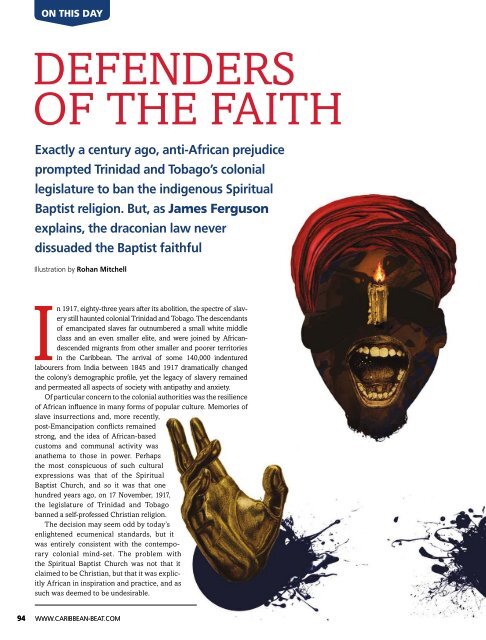Caribbean Beat — November/December 2017 (#148)
A calendar of events; music, film, and book reviews; travel features; people profiles, and much more.
A calendar of events; music, film, and book reviews; travel features; people profiles, and much more.
Create successful ePaper yourself
Turn your PDF publications into a flip-book with our unique Google optimized e-Paper software.
on this day<br />
Defenders<br />
of the faith<br />
Exactly a century ago, anti-African prejudice<br />
prompted Trinidad and Tobago’s colonial<br />
legislature to ban the indigenous Spiritual<br />
Baptist religion. But, as James Ferguson<br />
explains, the draconian law never<br />
dissuaded the Baptist faithful<br />
Illustration by Rohan Mitchell<br />
In 1917, eighty-three years after its abolition, the spectre of slavery<br />
still haunted colonial Trinidad and Tobago. The descendants<br />
of emancipated slaves far outnumbered a small white middle<br />
class and an even smaller elite, and were joined by Africandescended<br />
migrants from other smaller and poorer territories<br />
in the <strong>Caribbean</strong>. The arrival of some 140,000 indentured<br />
labourers from India between 1845 and 1917 dramatically changed<br />
the colony’s demographic profile, yet the legacy of slavery remained<br />
and permeated all aspects of society with antipathy and anxiety.<br />
Of particular concern to the colonial authorities was the resilience<br />
of African influence in many forms of popular culture. Memories of<br />
slave insurrections and, more recently,<br />
post-Emancipation conflicts remained<br />
strong, and the idea of African-based<br />
customs and communal activity was<br />
anathema to those in power. Perhaps<br />
the most conspicuous of such cultural<br />
expressions was that of the Spiritual<br />
Baptist Church, and so it was that one<br />
hundred years ago, on 17 <strong>November</strong>, 1917,<br />
the legislature of Trinidad and Tobago<br />
banned a self-professed Christian religion.<br />
The decision may seem odd by today’s<br />
enlightened ecumenical standards, but it<br />
was entirely consistent with the contemporary<br />
colonial mind-set. The problem with<br />
the Spiritual Baptist Church was not that it<br />
claimed to be Christian, but that it was explicitly<br />
African in inspiration and practice, and as<br />
such was deemed to be undesirable.<br />
94 WWW.CARIBBEAN-BEAT.COM


















